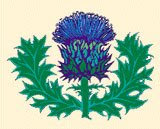In An Old Virginia Town - Part 6
Originally published in Harper's New Monthly Magazine
March 1885, pages 601-612.
Author: Frederick Daniel
(Continued from Part 5)
The house in which Mrs. Washington lived in the town is situated on Charles Street, and is preserved almost as it was in her day. It contains only two rooms and a dark hall on the ground-floor, and one small attic room, reached by a winding staircase from the hall. The walls, thinly plastered on the inside, appear stained and dingy from age; the worn plank floors, the wide wooden mantel and fire-place, and the narrow windows carry one back at sight to the olden time. The foundation, partly of brick and partly of large stones, is remarkably solid for such a slight superstructure, clad in narrow strips of weather-boarding, lately repainted; the roof, thatched with round-pointed shingles, and over which rises a tall brick chimney, is steep on the street side, and sloping to the rear in the form of a shed over the exit into the large garden, which contains a diminutive "kitchen." The garden formerly embraced the adjoining five blocks, now built over. The modern coat of paint given the old house at first leads one to doubt its antiquity, but a closer inspection, within and without, soon attests its great age. The genuine structure has been joined to a two-story building with ample porch, from which the entry is now made to the corridor of the Washington mansion.
The house as it looked in 1783, according to a picture on an old map hanging in one of the hotels, tallies with its present appearance. It is occupied by a small family, the members of which are occasionally called upon to show its points to patriotic strangers. The present tenant's wife, when exhibiting it to us, pointed to the corner near the window in the front room and remarked, "It was right there in that corner that George used sometimes to sit on a bench and straighten out his mother's accounts." That Mrs. Washington was a diligent worker is attested by both oral and written memoirs. She attended in person to her garden and dairy, milking and churning with her own hands; but the statement that she sold milk, butter, and eggs is erroneous, both because there was no market for them in the neighborhood and because she was under no need of making money, being always kept well supplied by her son George, never more dutiful than in his conduct toward her. Before, during, and after the Revolutionary war it was his frequent practice to visit her in this famous little house. During his visits, when a young man, dancing parties were often given by his mother, and at these all the belles of the town were invited to assist. The floors, not then worn, were smoothly waxed, and the front room was large enough to hold several dancing couples at once, as they went through the stately minuet or the more lively "Virginia reel," to the music of a single negro fiddler. At one time these parties a young belle was honored with the General's hand for a dance. As he led her out on the floor he remarked, "I didn't know I had such a pretty black-eyed cousin!" This young partner when an old lady would fondly boast of this triumph, and putting her hands to her eyes, smilingly say, "And they are bright yet!" The old lady was evidently pleased to picture herself as on the day when Washington danced with her.
On one occasion during the Revolution Washington called, and, finding his mother working in the garden, went out to greet her. Looking up and discovering him coming toward her, she laughingly exclaimed, "Well, George, haven't they caught you?" His reply was to hand her a bag of silver, a commodity scarce in that era of Continental paper, and then to escort her back into the house for a chat. An old citizen of Fredericksburg who witnessed this interview, and frequently heard her give expression to her sentiments during the war, used to say of her: "She was a high old piece! George got a great deal of his character and majesty from her. She was looked upon as leaning to the Tory side in politics." Doubtless in the beginning it was as grievous in her eyes to see her favorite son in the American army as it would have been to have seen him in King George's navy, from entering which he had only been dissuaded by his high appreciation of her devoted love.
Mrs. Washington lived very happily in this little house, and within its walls her last moments were passed. Twenty years ago a military company paraded in the streets on every 22d of February, invariably commencing the day's festivities by marching to the front of the house and firing a salute. The ceremony is now omitted, of course, as there is no parade of the soldiery on that day. The death of Mrs. Washington, which occurred several years before that of her illustrious son, was the occasion of an immense turn out of the citizens in the neighboring counties and villages. The funeral was a very plain one, entirely adapted to the expressed wishes of the deceased lady, though the procession to the grave she herself had chosen – about half a mile distant on the plain – was unavoidably large, owning to the great respect and love which all classes entertained for her.
(To be continued.)
Subscribe to:
Post Comments (Atom)

No comments:
Post a Comment